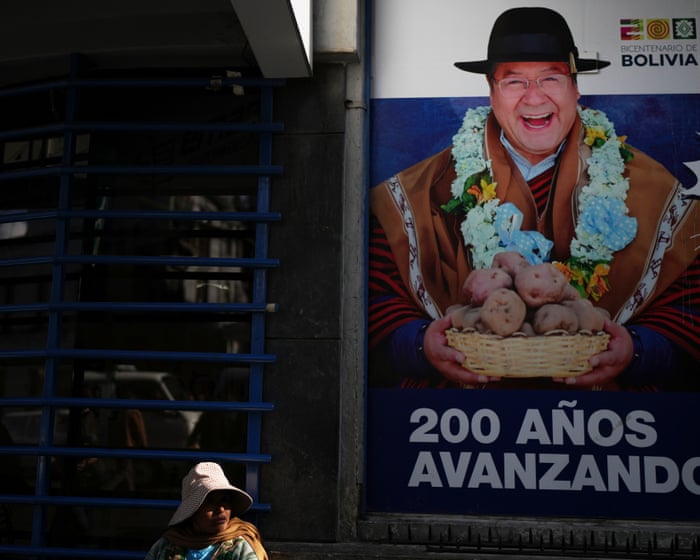Bolivians are heading to the polls in an election that could bring a right-wing shift, potentially ending nearly two decades of rule by the leftist Movement for Socialism (MAS) party.
The party, which first came to power with Evo Morales’ election in 2005, risks losing its legal status if it fails to secure at least 3% of the vote—a threshold it hasn’t reached in recent polls.
Two opposition candidates are neck-and-neck: center-right businessman and former planning minister Samuel Doria Medina, closely followed by right-wing ex-president Jorge “Tuto” Quiroga.
President Luis Arce, 61, deeply unpopular amid Bolivia’s worst economic crisis in 40 years, chose not to run for re-election. A former finance minister under Morales, Arce gradually took control of MAS in recent years. He has instead backed his 36-year-old government minister, Eduardo del Castillo, who has polled around 2%.
Morales, 65, faces an arrest warrant over allegations of fathering a child with a minor and has been holed up in a coca-growing region since October in an attempt to run again. After being barred from running by courts, Bolivia’s first Indigenous president called protests that turned violent. Now, he’s urging supporters to cast null votes, claiming that if these outnumber the leading candidate’s tally, it would mean he won.
Political analyst Carlos Toranzo doubts this strategy will work: “Before Morales’s call, null votes were around 10%; now they’re at 12%. Even if they rise, I doubt it’ll go much higher—and null votes have many causes, not just him.”
With Bolivia’s polls historically unreliable and many voters undecided, Toranzo believes there’s still a “small chance” a third candidate could make it to a runoff: 36-year-old senator Andrónico Rodríguez. The highest-polling leftist, Rodríguez was once seen as Morales’s heir due to his Indigenous roots and leadership in the coca growers’ union. But after launching his own candidacy with the left-wing coalition Popular Alliance, he was branded a traitor by Morales loyalists.
Enrique Mamani, leader of the Aymara Indigenous group Ponchos Rojos, supports Rodríguez, calling Morales the real traitor: “Those calling for null votes betray our grandparents’ struggle—they fought and died so we could have this right.”
About 7.9 million Bolivians are eligible to vote, with preliminary results expected by 9 p.m. local time. The election’s central issue is the economic crisis—the worst since 1985’s hyperinflation—marked by dollar shortages, fuel lines, and soaring prices.
If no candidate wins over 50% (or at least 40% with a 10-point lead), a runoff will be held on October 19. Analyst Toranzo is certain MAS will lose power, though he expects resistance: “It’ll be hard for them to hand over control after 20 years dominating parliament, the courts, and electoral bodies.”
Arce told The Guardian he’d respect the results if the right wins. While admitting his government’s unpopularity, he blamed much of the crisis and MAS’s decline on Morales, accusing his former ally’s parliamentary supporters of sabotaging his policies.
“Like Fidel Castro wrote, ‘history will absolve us’—in time, people will understand what we endured,” Arce said. “I’m sure they’ll miss us later.”
FAQS
### **FAQs About Bolivia’s Election and Potential End of Socialist Rule**
#### **Basic Questions**
1. **What is happening in Bolivia’s election?**
Bolivians are voting in a crucial election that could end nearly 20 years of socialist governance led by the MAS party.
2. **Why is this election significant?**
It may mark a major political shift, with opposition candidates challenging the socialist policies that have dominated Bolivia since Evo Morales took office in 2006.
3. **Who are the main candidates?**
The race includes Luis Arce and opposition leaders like Carlos Mesa or other conservative/centrist figures.
4. **What is the MAS party?**
The Movement Toward Socialism is Bolivia’s left-wing party, in power since 2006, known for pro-poor policies and nationalizing industries.
5. **How does Bolivia’s election system work?**
The president is elected by popular vote. If no candidate gets over 50%, a runoff is held.
—
#### **Intermediate Questions**
6. **What changes could happen if the opposition wins?**
A new government might reverse socialist policies, attract foreign investment, and reduce state control over industries like mining and gas.
7. **What are the key issues in this election?**
Major debates include economic stability, corruption, indigenous rights, and Bolivia’s reliance on natural resources like lithium.
8. **How has Evo Morales influenced this election?**
Morales still holds influence in MAS, but his controversial 2019 resignation and exile remain divisive.
9. **What role does lithium play in Bolivia’s politics?**
Bolivia has vast lithium reserves, and how they’re managed is a key debate in the election.
10. **Could there be protests or instability after the election?**
Yes, close results or disputes over fairness could lead to protests, similar to the unrest in 2019.
—
#### **Advanced Questions**
11. **How does this election impact Bolivia’s relations with the US and China?**
A socialist win may maintain close ties with China and leftist Latin American allies



